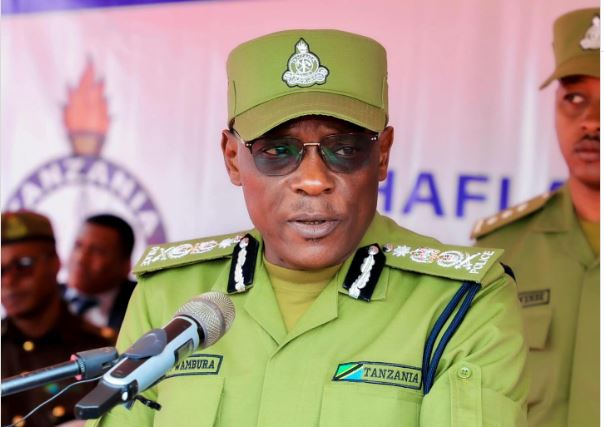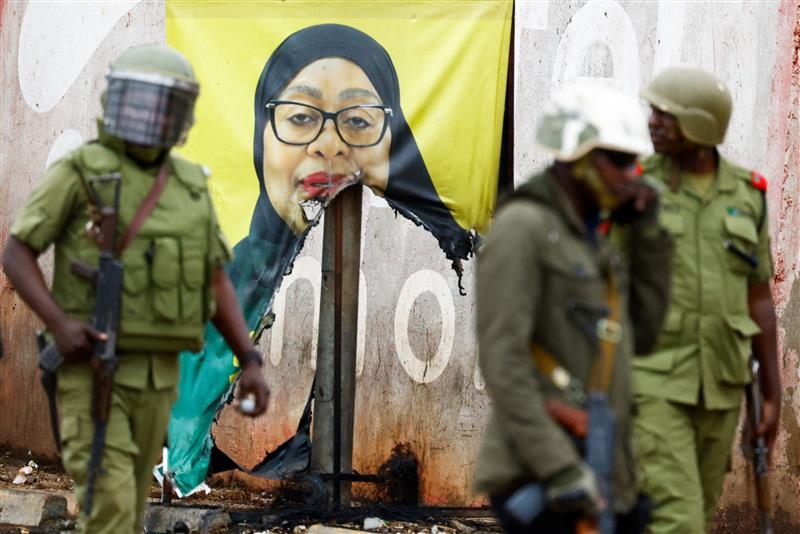
 Tanzania Inspector General of Police Camillus Wambura./FILE
Tanzania Inspector General of Police Camillus Wambura./FILETanzania has commenced a crackdown targeting foreigners whom it accuses of fanning three days of violence during the just-concluded elections.
Reports indicate that hotels, homes, and business entities are being searched in key cities and towns in an intelligence-led operation seeking to flush out the alleged criminals.
At the same time, security agencies have issued a stern warning that individuals found circulating ‘inciting, mocking, or destabilizing messages’ through social media, mass text messages, or digital platforms could face treason charges.
The caution came amid reports that hundreds of protesters were killed during the demonstrations, with gory pictures depicting the macabre killings emerging online as Tanzania switched on internet services after a five-day blackout.
It's not clear how many people were killed, with human rights groups and opposition parties claiming almost 1,000 people were killed. Tanzanian authorities are yet to release any figure.
In a warning to the public on Monday evening, the police force cautioned the public against sharing content that could “cause alarm, provoke unrest, or demean the dignity of others,” describing such actions as serious criminal offenses under Tanzanian law.
“Epuka kusambaza picha au video zenye kuleta taharuki au kutweza utu wa mtu. Kufanya hivyo ni kosa la jinai, na ukibainika, hatua kali za kisheria zitachukuliwa.” (Avoid sharing photos or videos that may cause panic or demean a person’s dignity. Doing so is a criminal offence, and if found, strict legal action will be taken,” the mass texts reads in part.
The warnings came shortly after President Samia Suluhu Hassan was sworn in at a military facility in the administrative capital, Dodoma, an event the public was locked out of but beamed live on state TV.
During the inauguration attended by, among others, Kenya’s Deputy President Prof. Kithure Kindiki, Suluhu said her government had evidence linking the unrest to foreign actors allegedly seeking to undermine national stability.
“It did not surprise us to learn that some of the young people arrested in connection with those riots came from outside the country,” she said.
Suluhu noted that Tanzania’s defense and security agencies are closely monitoring the situation and working to restore peace and order across the nation.
“I am directing the national, regional, and district defense and security committees to ensure that, starting today, normal life for citizens resumes immediately,” she stated.
A day before the inauguration, Tanzanian police claimed they had intelligence that foreigners in major towns were plotting a fresh round of protests.
“Tanzania Police have received information that a group of foreign nationals are in the country with the aim of committing crimes, including creating chaos. These people are purporting to do several jobs, including operating boda bodas,” the police spokesperson said in a statement.
According to the statement, the foreigners are reportedly operating in the provinces of Arusha, Dar es Salaam, Mbeya, Mwanza, Songwe, and other regions.
“As police follow up on these reports with a view to taking action in line with our laws, any citizen hosting a foreigner whose work is unknown or whose activities appear suspicious is asked to provide information to government officers,” the statement added.
Authorities have also warned that Tanzanians, including business entities found harbouring the foreigners, will be arrested and prosecuted in court.
Suluhu was declared the winner of the October 29 elections with about 98 per cent margin in an exercise where her main challengers were locked out of. The main opposition leader, Tundu Lissu of Chadema, is in jail facing treason charges.













![[PHOTOS] How Suluhu’s swearing in went down](/_next/image?url=https%3A%2F%2Fcdn.radioafrica.digital%2Fimage%2F2025%2F11%2F9cbad8a5-9bff-410e-b157-a335c61d6d8d.jpg&w=3840&q=100)










